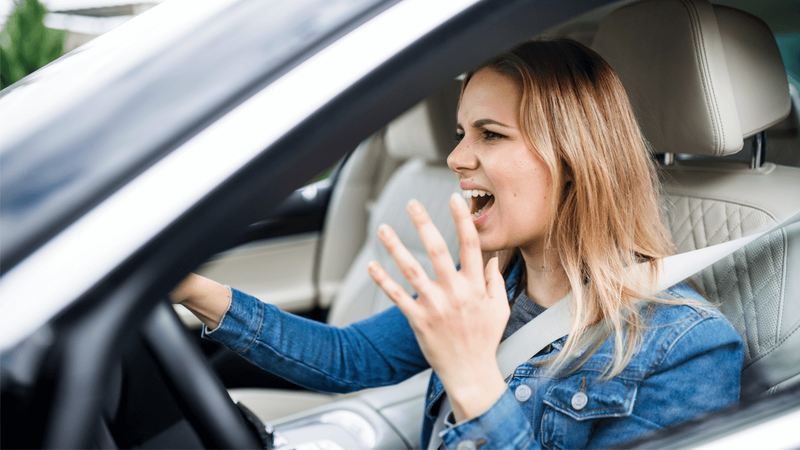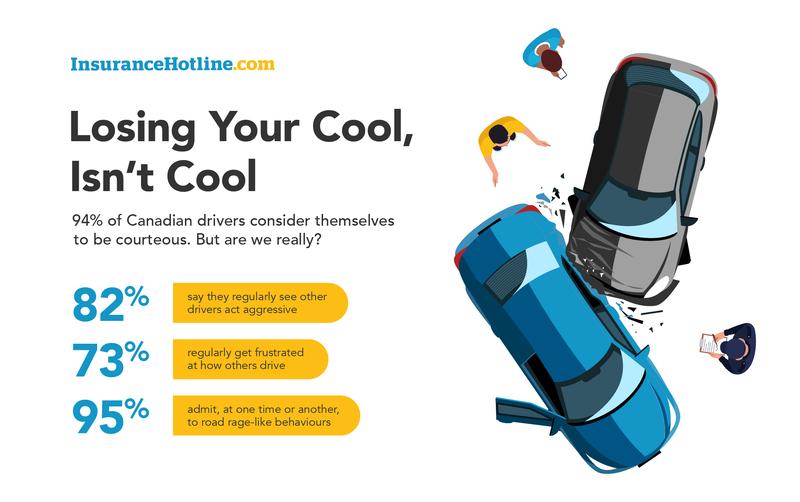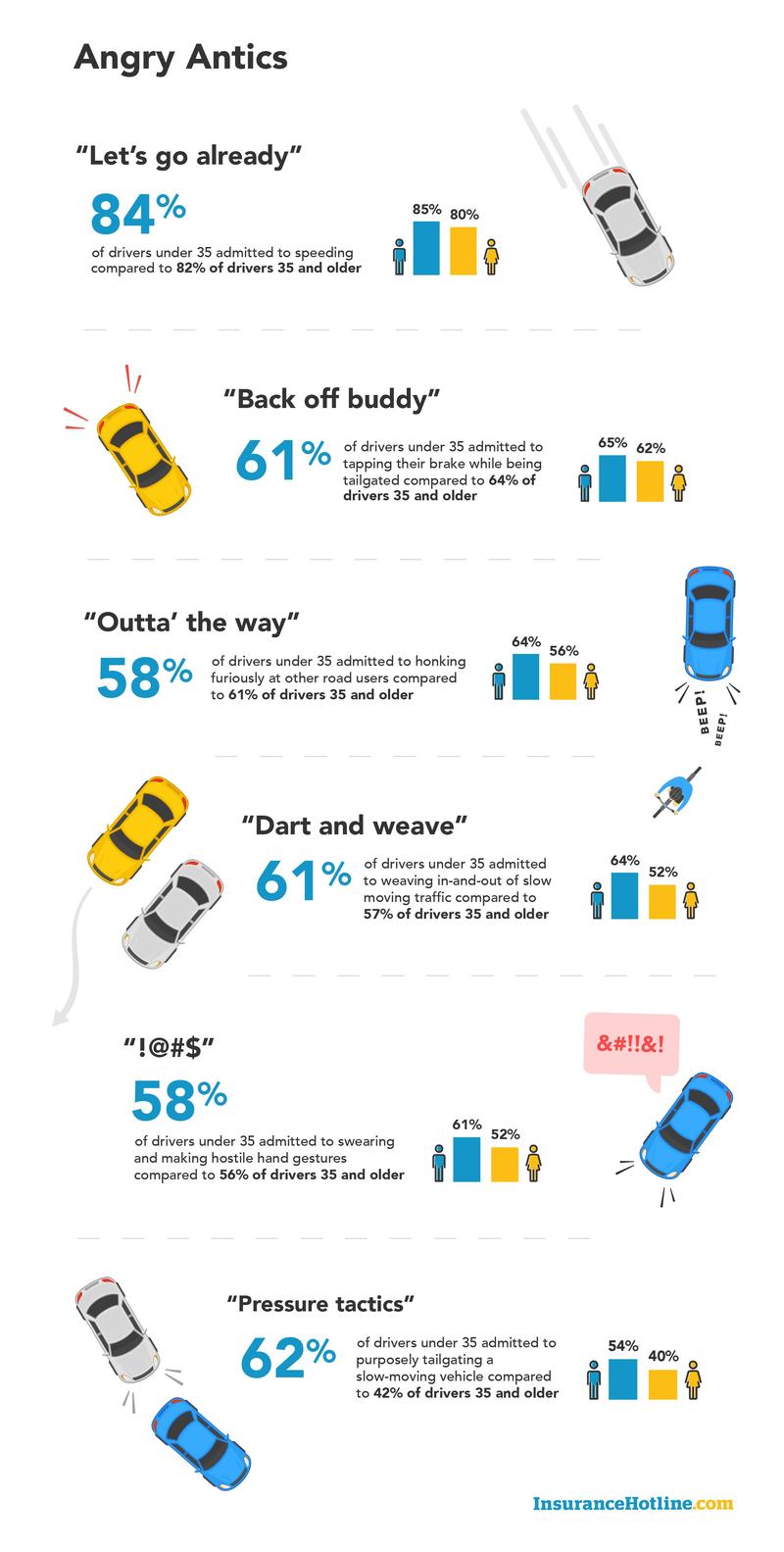- Canadian drivers are like Dr. Jekyll and Mr. Hyde; they perceive themselves one way, courteous, while their driving behaviour suggests something altogether different.
- Young male drivers are more likely to admit to being so angry while driving they’ve thought about – or acted on – impulses like throwing an object at another vehicle, physically confronting another driver, or following another person to intimidate them.
- An at-fault collision could increase your premium 25%, a minor ticket for speeding or tailgating an added 10%, and a ticket for careless driving will land you in the high-risk to insure category for at least three years.
An InsuranceHotline.com survey finds that Canadian drivers are like Dr. Jekyll and Mr. Hyde. On the one hand, 95% of respondents admit to occasionally being aggressive and road rage-like when driving, while on the other hand, 94% consider themselves courteous drivers.
From speeding and honking in frustrated anger to making use of choice hand gestures, drivers in this country seem to be anything but courteous. Respondents to the Leger survey, conducted in early April 2021, admit to various driving exploits that might have you wonder how any of us got our driver’s licence given our lack of driving decorum.
Dangerous manoeuvres
The survey found that drivers admit to a variety of angry antics. These behaviours are aggressive on their own and can border on road rage, and the rationalization “it rarely happens” doesn’t hold water. Other drivers may be affected by what you do, and while some can shrug it off, others don’t. All it takes is once to catch a driver in a foul mood to trigger a road rage event.
| Angry antics | Frequently | Sometimes | Rarely | Who admits to it most? |
|---|
| 82% admit to speeding | 14% | 35% | 33% | British Columbia (88%) |
| 63% confess to tapping their brake when tailgated | 9% | 26% | 28% | Saskatchewan /Manitoba (74%), Atlantic Canada (71%), and Alberta (70) |
| 60% own up to honking in angry frustration | 3% | 19% | 38% | Saskatchewan /Manitoba (66%) |
| 58% fess up to weaving in and out of slow-moving traffic | 5% | 18% | 36% | Quebec (69%), Saskatchewan /Manitoba (66%) |
| 57% confess to swearing and making hostile hand gestures | 5% | 17% | 35% | British Columbia (70%) |
| 47% admit to tailgating a slow-moving vehicle | 5% | 12% | 30% | Quebec drivers (57%) |
Anger is ageless, but it’s not gender-neutral
You’d be forgiven if you assumed younger drivers (under the age of 35) are more prone to aggressive driving. However, the survey results suggest this isn’t always the case.
While it is true younger drivers admit to speeding, weaving in and out of traffic, swearing/making rude hand gestures, and tailgating more, drivers aged 35 or older were more likely to admit to tapping their brake while being tailgated and honking their horn furiously at other drivers. And while anger may be ageless, it’s not gender-neutral, according to the survey results. In all categories, male respondents were more likely to admit to driving aggressively and road rage- like behaviours than women.
Dangerous impulses
Have you ever been so angry while driving that you thought about doing something impulsively? Something impulsive like throwing an object at another vehicle, physically confronting another driver, or trying to frighten someone by following them for a while?
Fortunately, for most people, the answer is ‘no’, but there are some for whom this is not the case, according to the survey’s findings:
- 28% of drivers say they’ve been angry enough while driving to think about doing something impulsive. Younger drivers under the age of 35 were more likely to admit to these rash thoughts than those 35 or older (38% versus 25%), as were men compared to women (35% versus 21%).
- 14% have been angry enough to do something impulsive. Again, younger drivers under the age of 35 were more likely to say they’ve acted on their reckless impulse than those 35 or older (21% versus 11%), as were men compared to women (21% versus 7%).
The anger may pass, but the consequences are for keeps
Whether it’s speeding, applying your brakes to slow down to annoy a tailgater, weaving in and out of traffic, or following another vehicle too closely, these are all unsafe driving actions that can lead to a collision, putting everyone’s safety at risk. They can also lead to a ticket. And while there’s no ticket for road rage, there are tickets for speeding, tailgating, unsafe lane changes, and careless driving. For extreme cases, like physically confronting someone, there are criminal charges too.
For someone with an otherwise clean driving record, the financial cost of road rage-like behaviour can be considerable to your auto insurance. An at-fault collision could increase your premium 25%, while a minor ticket for speeding or tailgating could cost an added 10%. A ticket for careless driving, which is a serious offence, will likely land you in the high-risk category for three years, costing several thousand dollars extra a year in coverage.
Keep calm and drive on
To avoid losing your cool behind the wheel, or incurring the wrath of another driver who is seeing red, consider the following tips:
- Give yourself plenty of time to get to where you want to go. Being late is stressful and can heighten your reaction to things that might not bother you otherwise.
- Know where you’re going and how you’re going to get there. Being lost or indecisive can lead to erratic driving.
- Treat other drivers the way you want to be treated. Signal your intentions to change lanes, drive the speed limit, and don’t block the passing lane, cut people off, or drive distracted.
- Remember, mistakes happen, and everyone makes them. Don’t let another person’s mistakes behind the wheel affect your mood or behaviour while driving.
- Don’t react to another driver’s aggression; it’ll only escalate matters: avoid eye contact, making rude hand gestures, and honking back.
On a final note, if you feel threatened by the actions of another driver, try to navigate away calmly. If they try to follow you, do not go home. Instead, head towards the nearest police station. If you’re in traffic or sitting at a red light, roll up your windows and lock your doors on the off chance they decide to approach you and never get out of your vehicle. Someone in this state cannot be reasoned with, and it’s best to do everything possible to avoid interaction.
About the Survey
An online survey of 1,522 Canadians was completed between April 2-4, 2021, using Leger’s online panel. No margin of error can be associated with a non-probability sample (i.e. a web panel in this case). For comparative purposes, though, a probability sample of 1,522 respondents would have a margin of error of ±2.5%, 19 times out of 20.


